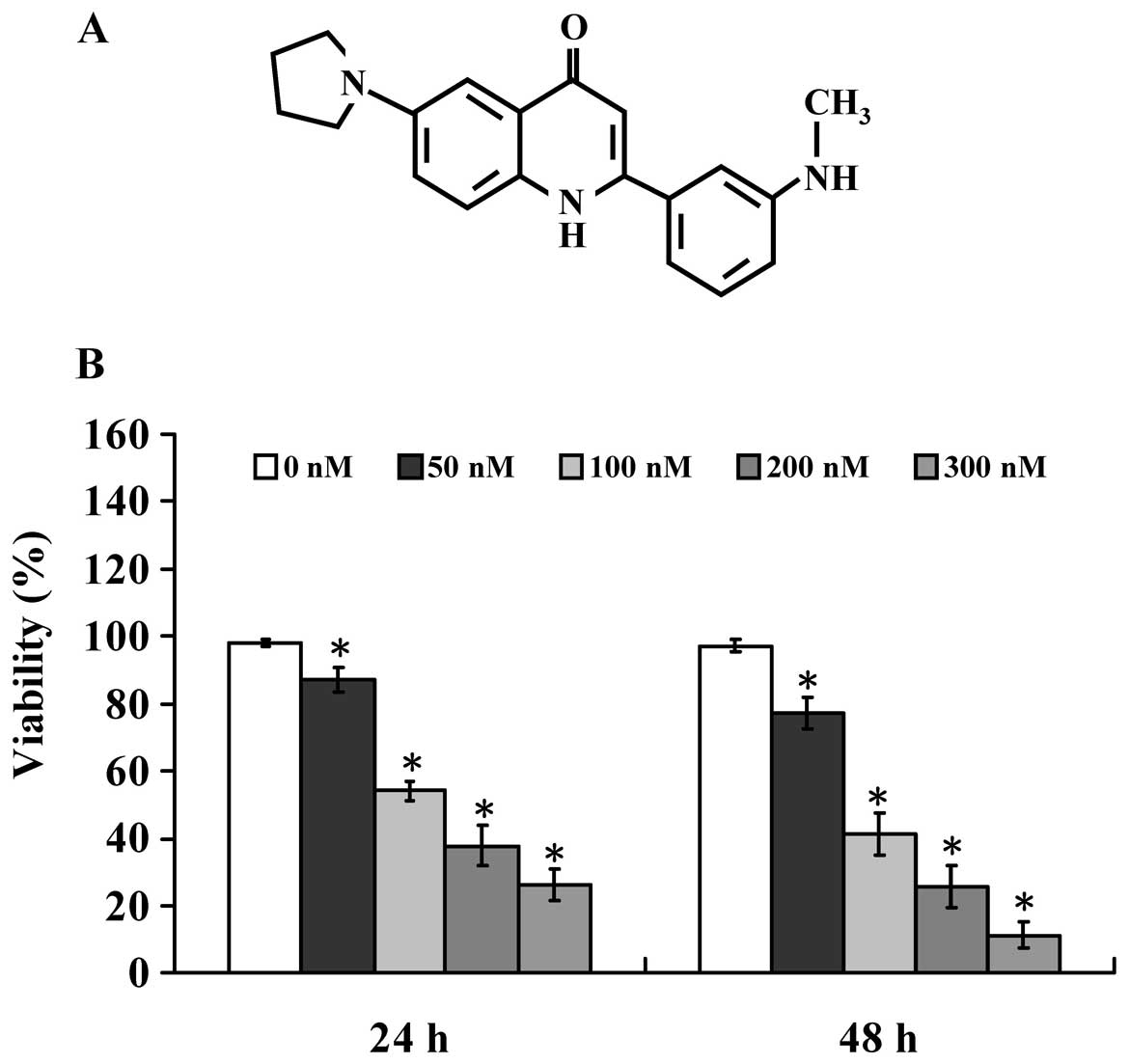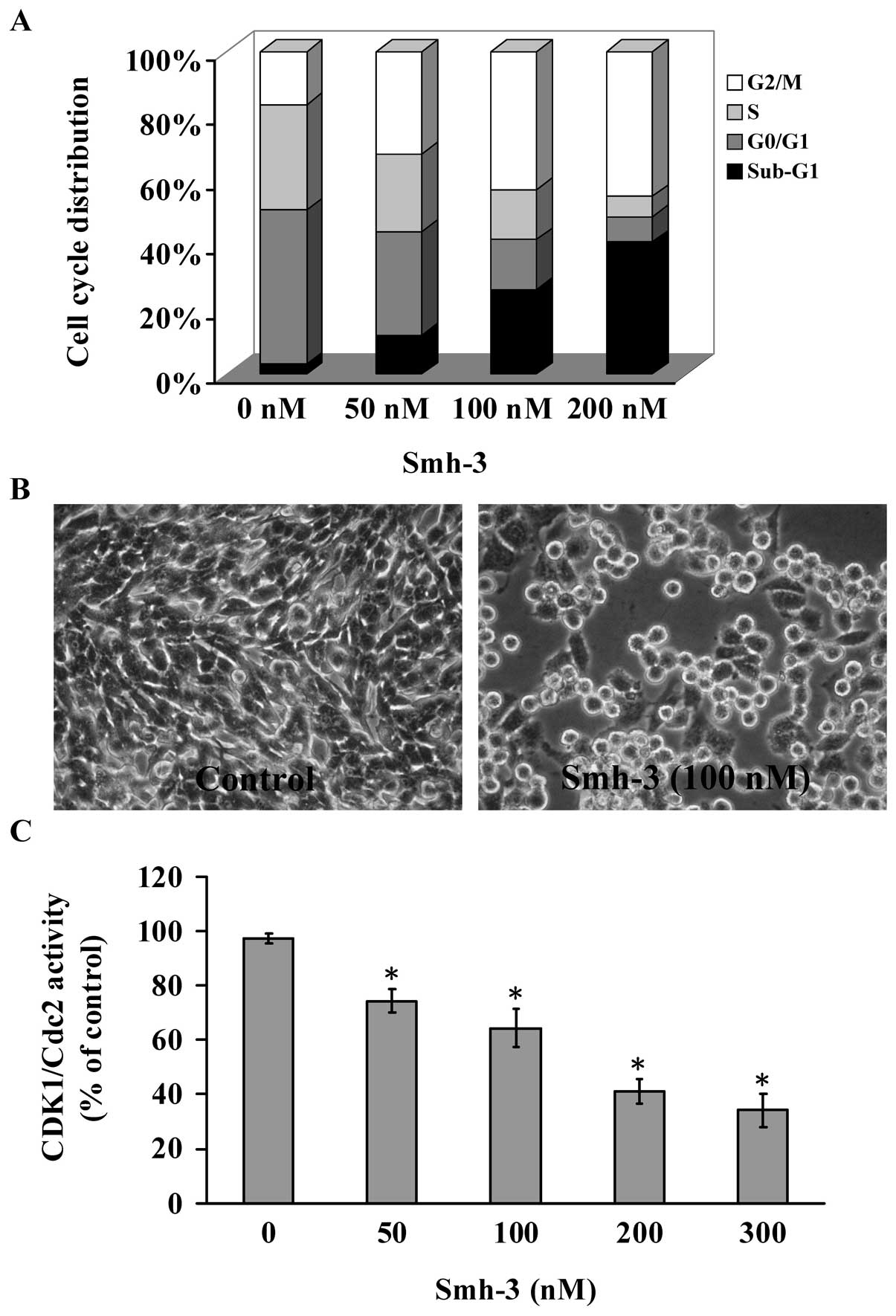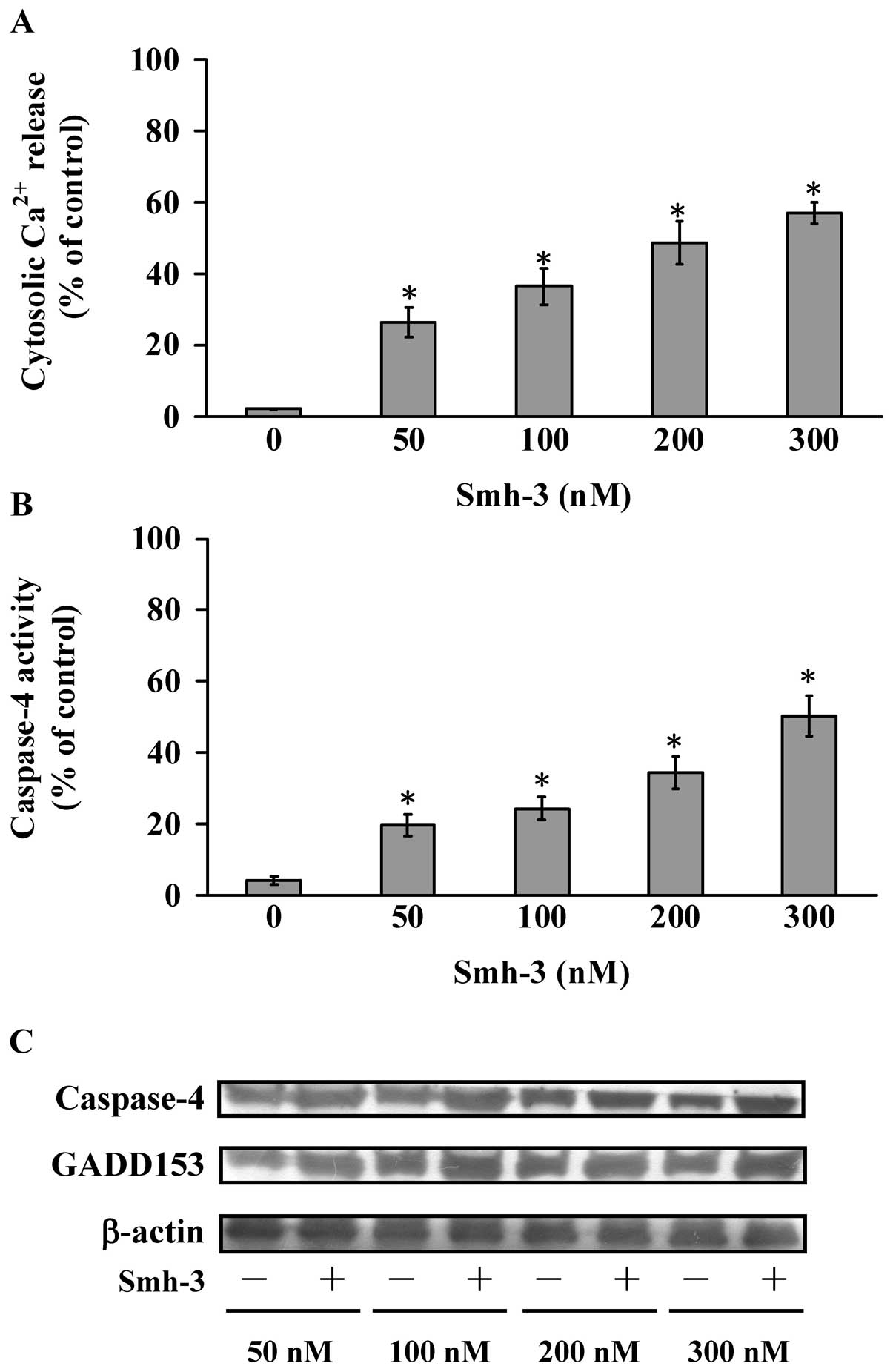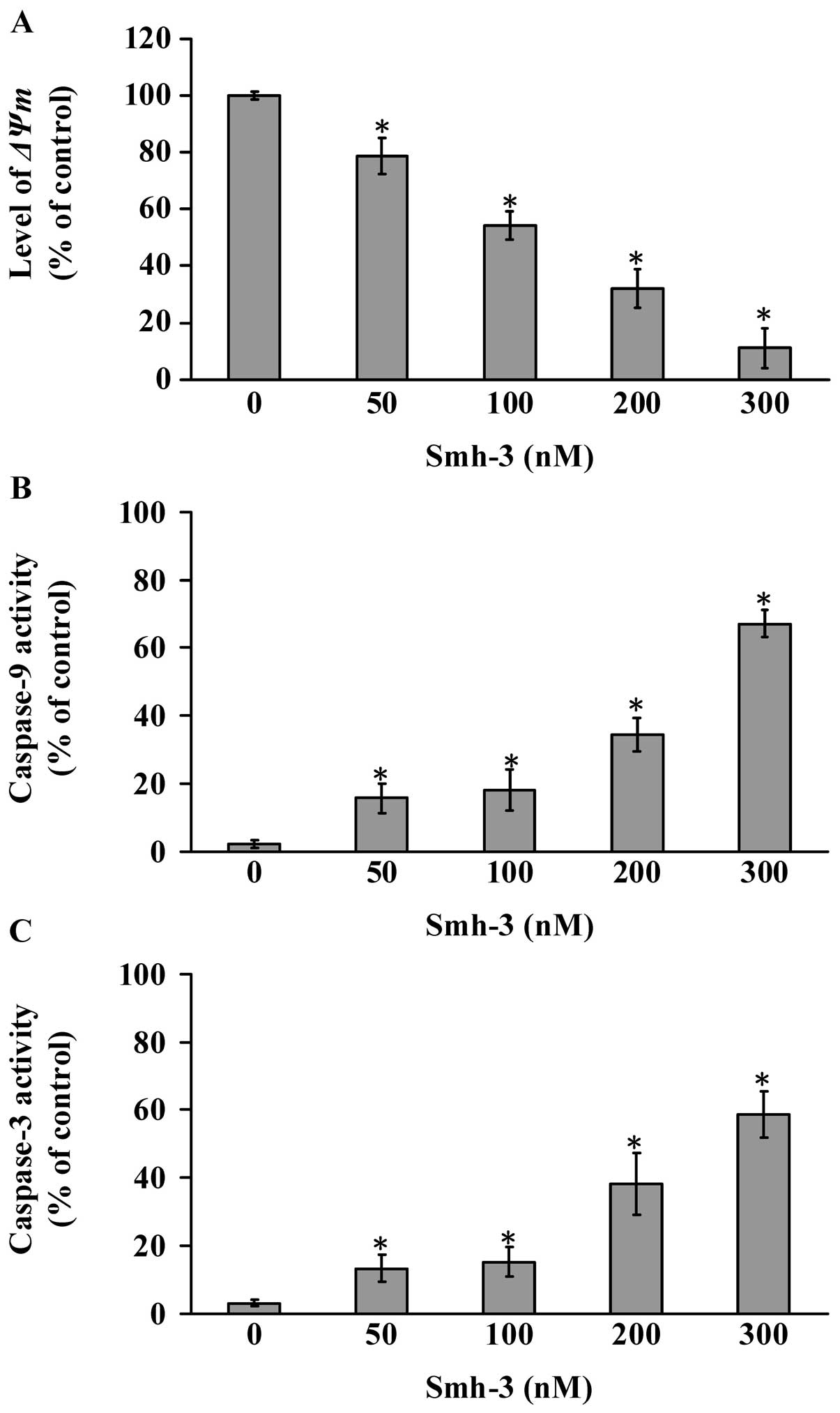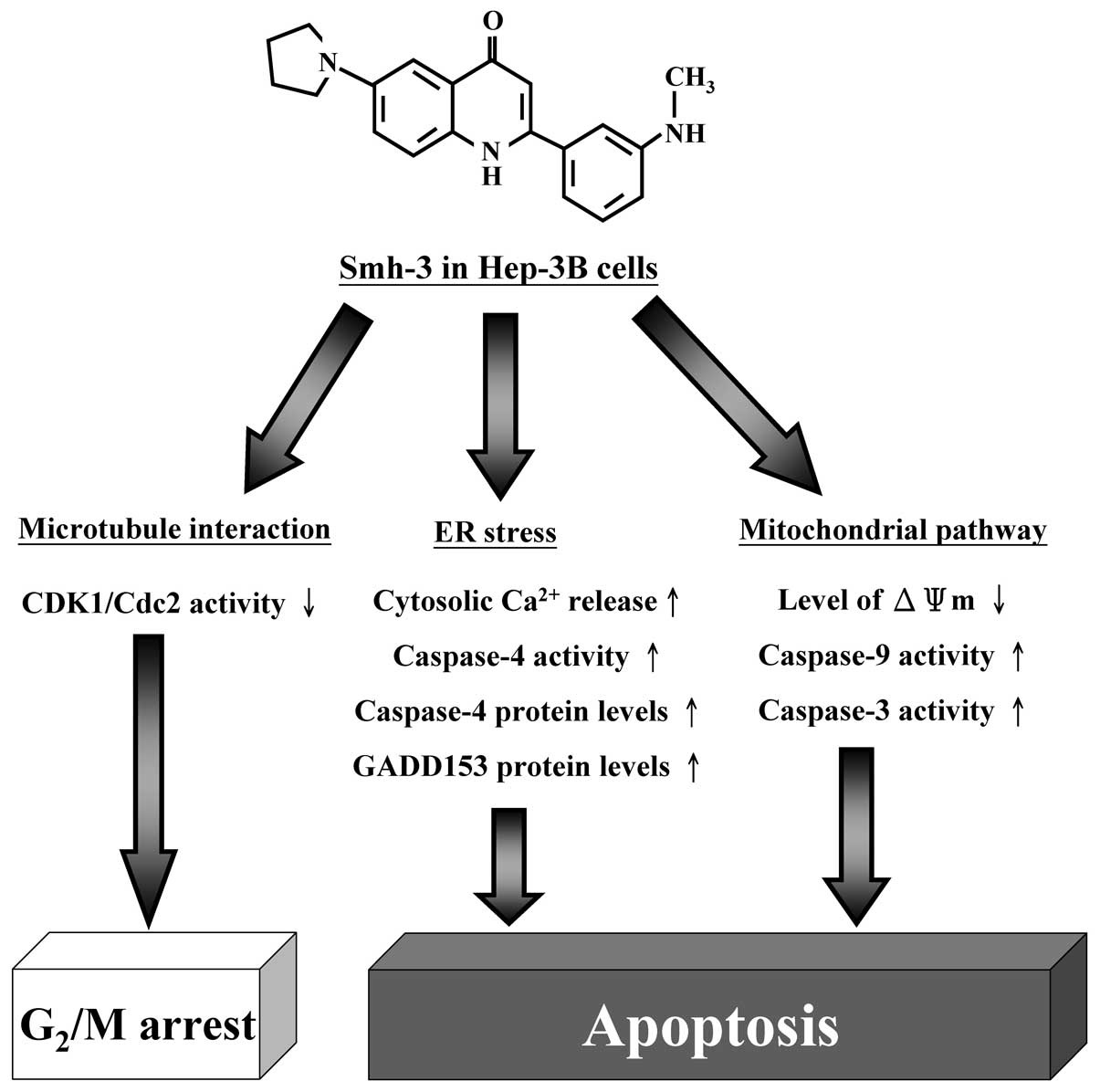|
1
|
Moriguchi M, Takayama T, Higaki T, et al:
Early cancer-related death after resection of hepatocellular
carcinoma. Surgery. 151:232–237. 2012. View Article : Google Scholar : PubMed/NCBI
|
|
2
|
Chen TH, Chen CJ, Yen MF, et al:
Ultrasound screening and risk factors for death from hepatocellular
carcinoma in a high risk group in Taiwan. Int J Cancer. 98:257–261.
2002. View Article : Google Scholar : PubMed/NCBI
|
|
3
|
Ueda H, Fukuchi H and Tanaka C: Toxicity
and efficacy of hepatic arterial infusion chemotherapy for advanced
hepatocellular carcinoma (Review). Oncol Lett. 3:259–263.
2012.PubMed/NCBI
|
|
4
|
Blum HE: Hepatocellular carcinoma: HCC.
Hepat Mon. 11:69–70. 2011.
|
|
5
|
Abou-Alfa GK: New agents in hepatocellular
carcinoma. Clin Adv Hematol Oncol. 6:423–424. 2008.
|
|
6
|
Marquardt JU, Galle PR and Teufel A:
Hepatocellular carcinoma: molecular pathogenesis and novel targets
for therapy. Dtsch Med Wochenschr. 137:855–860. 2012.(In
German).
|
|
7
|
Hoshida Y, Toffanin S, Lachenmayer A,
Villanueva A, Minguez B and Llovet JM: Molecular classification and
novel targets in hepatocellular carcinoma: recent advancements.
Semin Liver Dis. 30:35–51. 2010. View Article : Google Scholar : PubMed/NCBI
|
|
8
|
Chai F, Truong-Tran AQ, Ho LH and Zalewski
PD: Regulation of caspase activation and apoptosis by cellular zinc
fluxes and zinc deprivation: a review. Immunol Cell Biol.
77:272–278. 1999. View Article : Google Scholar : PubMed/NCBI
|
|
9
|
Crawford ED, Seaman JE, Barber AE II, et
al: Conservation of caspase substrates across metazoans suggests
hierarchical importance of signaling pathways over specific targets
and cleavage site motifs in apoptosis. Cell Death Differ. Aug
24–2012.(Epub ahead of print).
|
|
10
|
Oyadomari S and Mori M: Roles of
CHOP/GADD153 in endoplasmic reticulum stress. Cell Death Differ.
11:381–389. 2004. View Article : Google Scholar : PubMed/NCBI
|
|
11
|
Nozaki S, Sledge GW Jr and Nakshatri H:
Repression of GADD153/CHOP by NF-kappaB: a possible cellular
defense against endoplasmic reticulum stress-induced cell death.
Oncogene. 20:2178–2185. 2001. View Article : Google Scholar : PubMed/NCBI
|
|
12
|
McCullough KD, Martindale JL, Klotz LO, Aw
TY and Holbrook NJ: Gadd153 sensitizes cells to endoplasmic
reticulum stress by down-regulating Bcl2 and perturbing the
cellular redox state. Mol Cell Biol. 21:1249–1259. 2001. View Article : Google Scholar : PubMed/NCBI
|
|
13
|
Hogstrand K, Hejll E, Sander B, Rozell B,
Larsson LG and Grandien A: Inhibition of the intrinsic but not the
extrinsic apoptosis pathway accelerates and drives MYC-driven
tumorigenesis towards acute myeloid leukemia. PLoS One.
7:e313662012. View Article : Google Scholar
|
|
14
|
Poellinger L and Lendahl U: Modulating
Notch signaling by pathway-intrinsic and pathway-extrinsic
mechanisms. Curr Opin Genet Dev. 18:449–454. 2008. View Article : Google Scholar : PubMed/NCBI
|
|
15
|
Harding HP and Ron D: Endoplasmic
reticulum stress and the development of diabetes: a review.
Diabetes. 51(Suppl 3): S455–S461. 2002. View Article : Google Scholar : PubMed/NCBI
|
|
16
|
Muhlethaler-Mottet A, Bourloud KB,
Auderset K, Joseph JM and Gross N: Drug-mediated sensitization to
TRAIL-induced apoptosis in caspase-8-complemented neuroblastoma
cells proceeds via activation of intrinsic and extrinsic pathways
and caspase-dependent cleavage of XIAP, Bcl-xL and RIP. Oncogene.
23:5415–5425. 2004. View Article : Google Scholar
|
|
17
|
Chong ZZ, Kang JQ and Maiese K:
Erythropoietin fosters both intrinsic and extrinsic neuronal
protection through modulation of microglia, Akt1, Bad, and
caspase-mediated pathways. Br J Pharmacol. 138:1107–1118. 2003.
View Article : Google Scholar
|
|
18
|
Perrin FE, Boisset G, Lathuiliere A and
Kato AC: Cell death pathways differ in several mouse models with
motoneurone disease: analysis of pure motoneurone populations at a
presymptomatic age. J Neurochem. 98:1959–1972. 2006. View Article : Google Scholar : PubMed/NCBI
|
|
19
|
Kim MK, Kim HS, Lee IK and Park KG:
Endoplasmic reticulum stress and insulin biosynthesis: a review.
Exp Diabetes Res. 2012:5094372012.PubMed/NCBI
|
|
20
|
Gregor MF and Hotamisligil GS: Thematic
review series: Adipocyte Biology. Adipocyte stress: the endoplasmic
reticulum and metabolic disease. J Lipid Res. 48:1905–1914. 2007.
View Article : Google Scholar : PubMed/NCBI
|
|
21
|
Chakrabarti A, Chen AW and Varner JD: A
review of the mammalian unfolded protein response. Biotechnol
Bioeng. 108:2777–2793. 2011. View Article : Google Scholar : PubMed/NCBI
|
|
22
|
Shore GC, Papa FR and Oakes SA: Signaling
cell death from the endoplasmic reticulum stress response. Curr
Opin Cell Biol. 23:143–149. 2011. View Article : Google Scholar : PubMed/NCBI
|
|
23
|
Endo H, Murata K, Mukai M, Ishikawa O and
Inoue M: Activation of insulin-like growth factor signaling induces
apoptotic cell death under prolonged hypoxia by enhancing
endoplasmic reticulum stress response. Cancer Res. 67:8095–8103.
2007. View Article : Google Scholar : PubMed/NCBI
|
|
24
|
Obeng EA and Boise LH: Caspase-12 and
caspase-4 are not required for caspase-dependent endoplasmic
reticulum stress-induced apoptosis. J Biol Chem. 280:29578–29587.
2005. View Article : Google Scholar : PubMed/NCBI
|
|
25
|
Wang L, Song R, Shen Y, et al: Targeting
sarcoplasmic/endoplasmic reticulum Ca2+-ATPase 2 by
curcumin induces ER stress-associated apoptosis for treating human
liposarcoma. Mol Cancer Ther. 10:461–471. 2011.PubMed/NCBI
|
|
26
|
Wu Z, Liang F, Hong B, et al: An
endoplasmic reticulum-bound Ca(2+)/Mn(2+) pump, ECA1, supports
plant growth and confers tolerance to Mn(2+) stress. Plant Physiol.
130:128–137. 2002.
|
|
27
|
Lai YY, Huang LJ, Lee KH, et al: Synthesis
and biological relationships of 3′,6-substituted
2-phenyl-4-quinolone-3-carboxylic acid derivatives as antimitotic
agents. Bioorg Med Chem. 13:265–275. 2005.
|
|
28
|
Lee HZ, Lin WC, Yeh FT and Wu CH:
2-Phenyl-4-quinolone prevents serotonin-induced increases in
endothelial permeability to albumin. Eur J Pharmacol. 354:205–213.
1998. View Article : Google Scholar : PubMed/NCBI
|
|
29
|
Lee HZ: Inhibitory effect of
2-phenyl-4-quinolone on serotonin-mediated changes in the
morphology and permeability of endothelial monolayers. Eur J
Pharmacol. 335:245–254. 1997. View Article : Google Scholar : PubMed/NCBI
|
|
30
|
Wang JP, Hsu MF, Raung SL and Kuo SC:
Suppressive effect of 2-phenyl-4-quinolone (YT-1) on hind-paw edema
and cutaneous vascular plasma extravasation in mice. Naunyn
Schmiedebergs Arch Pharmacol. 349:324–330. 1994.PubMed/NCBI
|
|
31
|
Huang SM, Yang JS, Tsai SC, et al: The
novel synthesized
2-(3-(methylamino)phenyl)-6-(pyrrolidin-1-yl)quinolin-4-one (Smh-3)
compound induces G2/M phase arrest and mitochondrial-dependent
apoptotic cell death through inhibition of CDK1 and AKT activity in
HL-60 human leukemia cells. Int J Oncol. 38:1357–1364. 2011.
View Article : Google Scholar
|
|
32
|
Ni CH, Chen PY, Lu HF, et al:
Chrysophanol-induced necrotic-like cell death through an impaired
mitochondrial ATP synthesis in Hep3B human liver cancer cells. Arch
Pharm Res. 35:887–895. 2012. View Article : Google Scholar
|
|
33
|
Tsai SC, Yang JS, Peng SF, et al: Bufalin
increases sensitivity to AKT/mTOR-induced autophagic cell death in
SK-HEP-1 human hepatocellular carcinoma cells. Int J Oncol.
41:1431–1442. 2012.PubMed/NCBI
|
|
34
|
Hour MJ, Tsai SC, Wu HC, et al: Antitumor
effects of the novel quinazolinone MJ-33: inhibition of metastasis
through the MAPK, AKT, NF-kappaB and AP-1 signaling pathways in
DU145 human prostate cancer cells. Int J Oncol. 41:1513–1519.
2012.
|
|
35
|
Wu PP, Chung HW, Liu KC, et al: Diallyl
sulfide induces cell cycle arrest and apoptosis in HeLa human
cervical cancer cells through the p53, caspase- and
mitochondria-dependent pathways. Int J Oncol. 38:1605–1613.
2011.
|
|
36
|
Huang WW, Ko SW, Tsai HY, et al:
Cantharidin induces G2/M phase arrest and apoptosis in human
colorectal cancer colo 205 cells through inhibition of CDK1
activity and caspase-dependent signaling pathways. Int J Oncol.
38:1067–1073. 2011.
|
|
37
|
Yaguchi T, Saito M, Yasuda Y and Nishizaki
T: Caspase-4 activation in association with decreased adenosine
deaminase activity may be a factor for gastric ulcer. Digestion.
81:62–67. 2010. View Article : Google Scholar : PubMed/NCBI
|
|
38
|
Wu SH, Hang LW, Yang JS, et al: Curcumin
induces apoptosis in human non-small cell lung cancer NCI-H460
cells through ER stress and caspase cascade- and
mitochondria-dependent pathways. Anticancer Res. 30:2125–2133.
2010.PubMed/NCBI
|
|
39
|
Huang WW, Chiu YJ, Fan MJ, et al:
Kaempferol induced apoptosis via endoplasmic reticulum stress and
mitochondria-dependent pathway in human osteosarcoma U-2 OS cells.
Mol Nutr Food Res. 54:1585–1595. 2010. View Article : Google Scholar : PubMed/NCBI
|
|
40
|
Huang WW, Yang JS, Lin MW, et al:
Cucurbitacin E induces G(2)/M phase arrest through STAT3/p53/p21
signaling and provokes apoptosis via Fas/CD95 and
mitochondria-dependent pathways in human bladder cancer T24 cells.
Evid Based Complement Alternat Med. 2012:9527622012. View Article : Google Scholar
|
|
41
|
Wu RC, Yu CS, Liu KC, et al: Citosol
(thiamylal sodium) triggers apoptosis and affects gene expressions
of murine leukemia RAW 264.7 cells. Hum Exp Toxicol. 31:771–779.
2012. View Article : Google Scholar : PubMed/NCBI
|
|
42
|
Lin JP, Yang JS, Chang NW, et al: GADD153
mediates berberine-induced apoptosis in human cervical cancer Ca
ski cells. Anticancer Res. 27:3379–3386. 2007.PubMed/NCBI
|
|
43
|
Lu HF, Hsueh SC, Ho YT, et al: ROS
mediates baicalin-induced apoptosis in human promyelocytic leukemia
HL-60 cells through the expression of the Gadd153 and
mitochondrial-dependent pathway. Anticancer Res. 27:117–125.
2007.
|
|
44
|
Chambers KT, Unverferth JA, Weber SM, Wek
RC, Urano F and Corbett JA: The role of nitric oxide and the
unfolded protein response in cytokine-induced beta-cell death.
Diabetes. 57:124–132. 2008. View Article : Google Scholar : PubMed/NCBI
|
|
45
|
Kim R, Emi M, Tanabe K and Murakami S:
Role of the unfolded protein response in cell death. Apoptosis.
11:5–13. 2006. View Article : Google Scholar : PubMed/NCBI
|
|
46
|
Lu CC, Yang JS, Chiang JH, et al: Novel
quinazolinone MJ-29 triggers endoplasmic reticulum stress and
intrinsic apoptosis in murine leukemia WEHI-3 cells and inhibits
leukemic mice. PLoS One. 7:e368312012. View Article : Google Scholar : PubMed/NCBI
|
|
47
|
Schattenberg JM, Schuchmann M and Galle
PR: Cell death and hepatocarcinogenesis: dysregulation of apoptosis
signaling pathways. J Gastroenterol Hepatol. 26(Suppl 1): 213–219.
2011. View Article : Google Scholar : PubMed/NCBI
|
|
48
|
Rosello A, Warnes G and Meier UC: Cell
death pathways and autophagy in the central nervous system and its
involvement in neurodegeneration, immunity and central nervous
system infection: to die or not to die - that is the question. Clin
Exp Immunol. 168:52–57. 2012. View Article : Google Scholar : PubMed/NCBI
|















